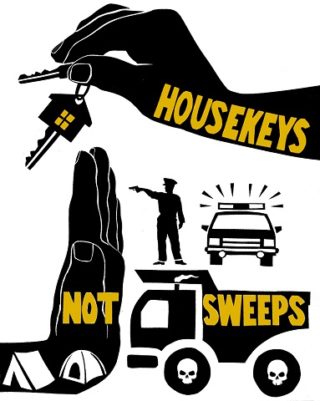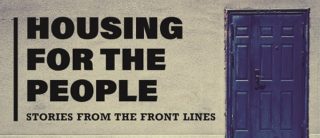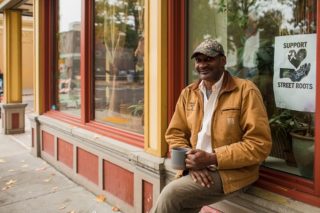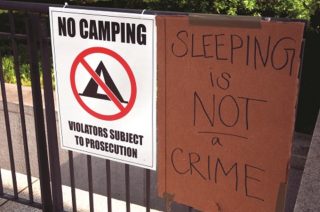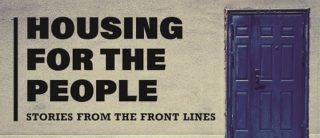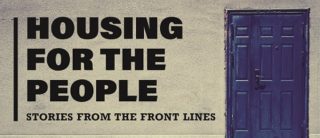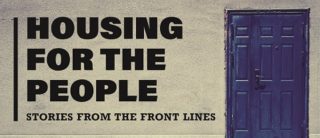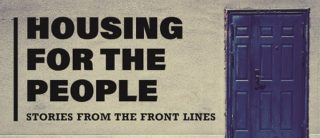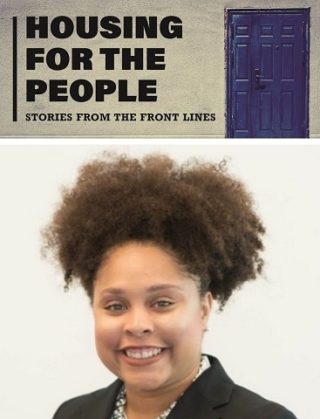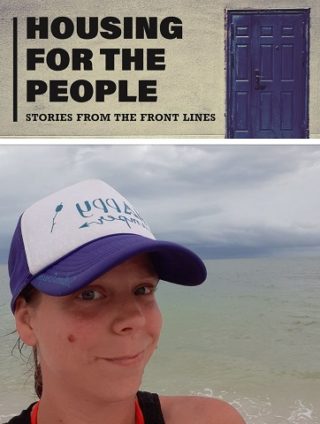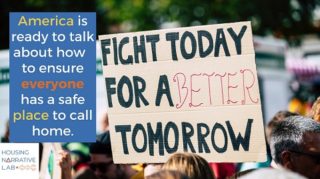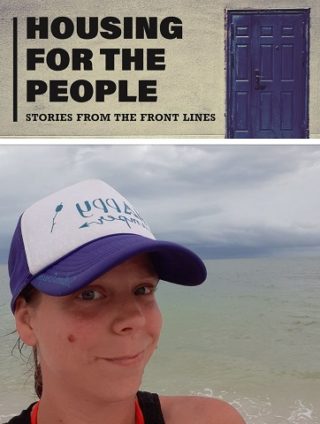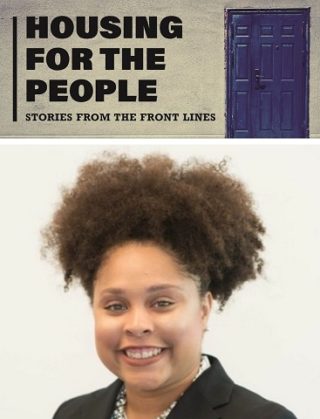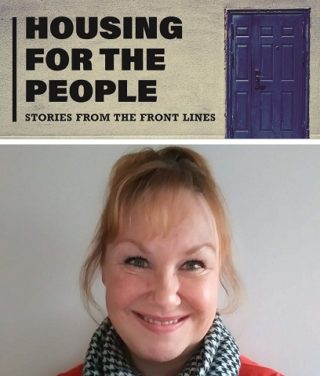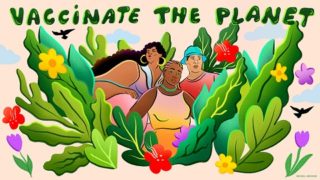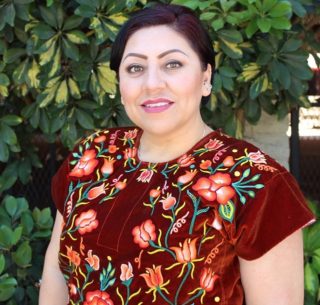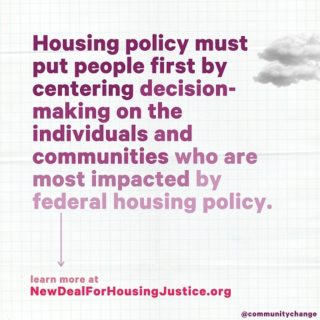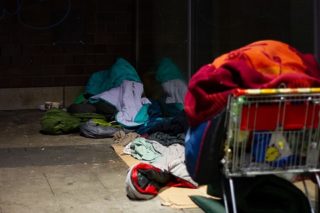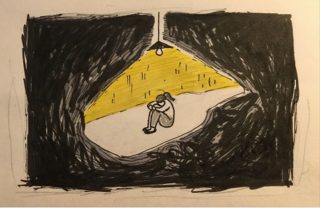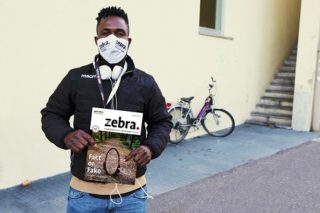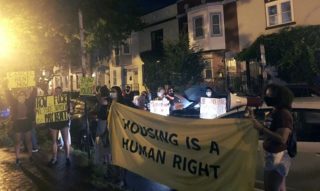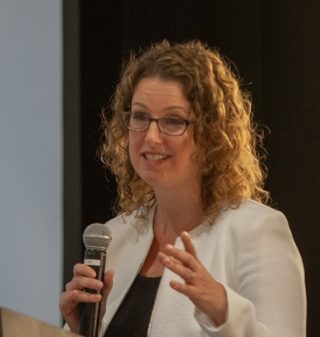Raising awareness about camps, sweeps and displacement in the United States
In recent months, cities and states across the United States have dramatically increased their efforts to sweep and displace homeless encampments and to criminalize people on the streets. A series of posters as part of the nation-wide campaign ‘Housekeys Not Sweeps’, led by the Western Regional Advocacy Project, is raising awareness and combating criminalization efforts and anti-homeless legislation occurring across the country.
Housing for the People: “Tennessee’s anti-homelessness law feels like someone ripping our collective hearts out”
Tennessee is Vicky Batcher’s home, and it is a place she is witnessing turn against people who don’t have shelter and must make their home on the street, a position she knows all too well from past experience. In the latest in INSP’s Housing for the People column, she writes about the jarring experience of seeing the place you live criminalize homeless people – people Vicky has a kinship with – as Tennessee will do with the passing of a new law.
Housing for the People: “I came back to life in a time of trouble”
Gary Barker, who sells Portland street paper Street Roots, writes for the latest in INSP’s Housing for the People – a column that allows those with lived experience of poverty, homelessness and insecure housing tell their story – writes about being “in a hell of my own doing”, but how with the pandemic making the world seem like world was falling apart, circumstances in Gary’s life suddenly made things start to come together. He writes about his work as an ambassador for Street Roots and leading on its MoJo scheme to get vendors into journalism, and how being in housing allows him to “find a way to get problems off my mind”.
Homelessness is not a crime: Nashville street paper vendors on Tennessee anti-homelessness bill
Paul A. and Vicky B., who both sell the street paper The Contributor in Nashville, write about the “great injustice” that is the recent Tennessee Senate Bill 1610, which makes rough sleeping and homelessness camps on public land a criminal act. The bill has since passed into law without the signature of Tennessee Governor Bill Lee.
Housing for the People: “Until I can make my dream happen…”
Brian Augustine, who sells Colorado street paper the Denver VOICE, writes for the latest in INSP’s Housing for the People series about how happenstance, and events outside his control, led to him losing the place he called home. Now, he counts the street paper as his home, and the people who come by his place of work as his family.
Housing for the People: How an affordable apartment changed my life
For Vicky Batcher, a regular face with and in Nashville street paper The Contributor, simply liking a Facebook page set her on a road toward a roof of her own over her head. For the latest in INSP’s ‘Housing for the People’ column, she writes about the rush of emotions that experiencing safety and security for the first time in years brought her.
Housing for the People: “We have to go beyond people just attaining housing”
For the latest instalment of INSP’s ‘Housing for the People’ column, Denver VOICE contributor Larmarques ‘Misha’ Smith writes about their journey from temporary to stable housing, their experience of shelters throughout the pandemic, and how ensuring housing is a right enjoyed by all should be done intersectionally with multiple goals in mind.
Housing for the People: “I was homeless on the road raising a child”
In this deeply personal piece for INSP’s ‘Housing for the People’ column, the writer tells a story of displacement and homelessness that spans continents in an attempt to escape the horror of domestic violence and to give her child the chance of a better life, even if it meant experiencing a period of transition living outside first.
Housing for the People: Addressing housing instability with equity in mind
Janiah Miller – an advocate experienced in providing support to political campaigns and offices, assisting in legislative and constituent support, and building intersectional coalitions within the community – writes for INSP’s latest ‘Housing for the People’ column about how the culminating moment of the American Dream – owning a home – is not equitably accessible to all.
Housing for the People: “Dear President Biden…”
Interweaving her own personal story with evidence of the current homelessness issue in Oregon, columnist Mandee Seeley drafts a heartfelt epistle to the US President about how to properly address the housing crisis. The letter is the latest instalment in INSP’s Housing for the People series.
The Housing Narrative Lab is helping tell the story of housing insecurity and homelessness in America
The Housing Narrative Lab is a new communications and narrative research hub dedicated to sharing the stories of people facing housing insecurity and the systems that drive people into homelessness. Here, its director Marisol Bello writes about what’s wrong with American policies and how they negatively impact women who remain the vast majority of single parents in the US, some of whom have to choose- during a pandemic – between leaving young children at home alone or risking their jobs.
Housing for the People: “Like the air we breathe, housing is a basic human need”
Mandee Seeley spent three of her five years in Oregon without a home, living in the national forest with her husband and two children. For the latest instalment of INSP’s ‘Housing for the People’ column, she writes from her personal perspective about the basic requirement of all humans to have a home, and how the system should reflect that.
Housing for the People: Housing justice as a central voting issue
Janiah Miller – an advocate experienced in providing support to political campaigns and offices, assisting in legislative and constituent support, and building intersectional coalitions within the community – writes for INSP’s ‘Housing for the People’ column about how the affordable housing crisis remains at a historic nadir and how local organizations must continuously elevate affordable housing and homeownership as top priorities in their communities and bringing them to the attention of those with the power to affect change.
Housing for the People: “We got into our new apartment right before Christmas – it was the best gift!”
Mindy Woods and her son were forced to leave their dilapidated and mold infested home when it began to affect their health. Their experience thereafter is a story of lows – navigating the Kafkaesque public housing and benefits rigmarole, facing up to the “embarrassment” of having to tell her son’s teachers they were homeless – but also the high of finally getting a place to call home. A tireless housing and social justice advocate, Mindy shares her story here – as part of INSP’s new ‘Housing for the People’ column – to affect public perception and create policy change.
Poster campaign emphasises the importance of getting vaccinated against COVID-19
Social art and design lab Amplifier has made available to street papers posters which emphasise the importance of getting vaccinated against COVID-19 and encourage those who have yet to be immunised to do so. Coinciding with street papers reporting on the attitudes and experiences of marginalised communities when it comes to the vaccine, the posters aim to spread the message of community protection.
#LookTalkAct: Hungarian street paper Fedél Nélkül launches campaign to transform how homelessness is portrayed and perceived
Hungary’s street paper Fedél Nélkül has launched a campaign, in collaboration with other international organisations, that seeks to change the way homelessness and people on the street are visually portrayed. Bemoaning negatively charged images often used in the media to illustrate homelessness, the #LookTalkAct project will create an open source, free online collection of art and photos which will improve the visual appearance of publications covering homelessness, journalists, non-governmental organizations and activists.
“Housing is a basic human need”: The US Government needs to address the housing crisis
Brook Fadley discusses the lack of safe and accessible housing infrastructure in her op-ed, the last in a series in collaboration with housing advocacy group Community Change. She writes that many people are vulnerable to homelessness due to the pandemic and the government needs to step up to solve it, urging the Biden Administration to pass the New Deal for Housing Justice.
Proper housing means having a home for your family
Idalia Rios discusses the definition of homelessness in this op-ed, the latest in a series in collaboration with housing advocacy group Community Change. To this immigrant mother, you can be homeless even if you have a roof over your head. She writes how proper housing, a foundation for a family, is a home. She urges the community to take action and to step into someone else’s shoes to provide more people with real homes.
Why centering lived experience is vital for the future of housing policy-making in the US
In the second of a series of columns about the Housing Playbook initiative to influence policy direction in the US around housing and homelessness by advocacy group Community Change, Zella Knight, an LA County housing commissioner, writes about how those with experience of the system are integral to changing it.
Housing for the future: Andreanecia M. Morris on how the Housing Playbook Project will shape government’s responsibility to provide a home to those who need it
In this Q&A, housing advocate and expert Andreanecia M. Morris talks with Community Change communications fellow Darryl Lorenzo Wellington about the US housing crisis and recommendations for the new administration and Congress as part of the Housing Playbook Project.
German street papers call for hotels to house the homeless for the remainder of COVID-19 pandemic
13 German street papers, including INSP members, have banded together to demand that the country’s state and city officials use empty hotels to house those experiencing homelessness amid ongoing restrictions and “stay at home” pleas due to the coronavirus. A petition laying out their concerns has already reached over 2,500 signatures.
Combatting social isolation during the pandemic
During the course of the last year, COVID-19 has grown from an invisible threat to a pervasive international health emergency. The virus has also impacted mental health and sparked instances of relapse. Oklahoma City street paper The Curbside Chronicle spoke with those who’ve struggled with feeling alone and those working the frontlines of mental health to shine a light on the dark side of social isolation and discover some hope.
“To those we hold in high esteem”: Street Roots vendor Rick Davis remembers those who have been lost on the street
Rick Davis, a longtime vendor of Portland’s Street Roots, this year set about creating a dedication wall to mark Homeless Persons’ Memorial Day and all those who have died on the streets.
“I hope the whole community will rise again”: Street paper vendors look beyond the pandemic
For society’s most vulnerable and marginalised, 2020 – and the pandemic that has defined it – has exacerbated problems already familiar to them: food security, unstable housing, social isolation, income, and access to social services as they are weakened at a time they’re needed most. Street papers, which exist to alleviate that strain, have been impacted too. It’s been hard, but the effects they’ve felt have not been uniform. As the new year approaches, INSP checked in with street paper vendors of differing circumstances across the world to reflect on these past months and to look forward with some hope.
“The system is failing all the families that really need it”: How the threat of eviction has perpetuated health inequity and racial injustice during the pandemic
Black and Hispanic communities have faced inequities and injustices based on race even before the COVID-19 pandemic. Now that stimulus packages and eviction moratoriums are running out or expiring, futures are even more uncertain for these communities, who have also been hit hardest with higher job or income loss than white communities, says health and housing law expert Emily A. Benfer.
“I see opportunities for solutions”: The connections between food waste, homelessness, and COVID-19
Food waste and homelessness are often seen as two separate issues. However, there are many organizations across the United States working on solutions to both problems at once. Even with the difficulties of COVID-19, organizations are finding ways to help support the larger numbers of people needing food support by recovering significant amounts of food that would be wasted through shutdowns.
“At 15 years old, I was thrown from living barely above the poverty line to not having a home”: How the climate emergency exacerbates homelessness
In 2007, a flash flood ripped through Kathryn McKelvey’s home in a rural Oregon town, leaving it utterly destroyed and her family homeless. As fires now consume the western United States, McKelvey, a tireless homeless advocate, shows through her personal story how the climate crisis – and the increasing frequency and destructiveness of the natural disasters that come with it – is causing more and more people to fall into poverty and homelessness, with no safety net.
US housing advocate Diane Yentel on housing in America: Where do we go from here?
Diane Yentel is the President and CEO of the National Low Income Housing Coalition, a membership organization dedicated solely to achieving socially just public policy that ensures people with the lowest incomes in the United States have affordable and decent homes. One of America’s leading voices on housing and homelessness, she spoke with INSP North America’s Israel Bayer about the housing crisis in America, what’s at stake in the upcoming Presidential election, the intersection of racial and climate justice with housing, and what readers can do about it.




